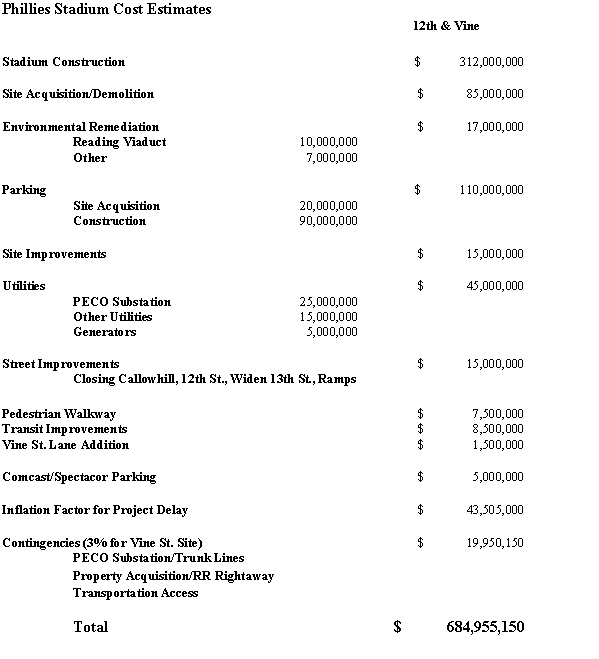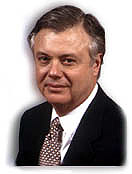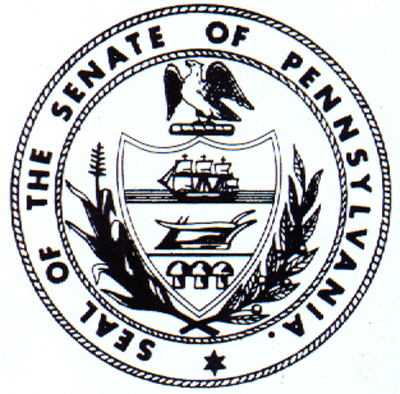|
|
||||||
STADIUM
AT 12TH AND VINE WOULD COST $685 MILLION HARRISBURG,
June 7, 2000 B A
new major league baseball stadium at 12th and Vine Streets
downtown would cost approximately $685 million, according to a study
conducted for state Senator Vincent J. Fumo (D-Philadelphia.) That amount is nearly $370 million more than the estimate for
a South Philadelphia ballpark, which was projected last November to be
about $315 million by the Phillies, the Rendell Administration and the
Philadelphia Industrial Development Corporation (PIDC.). The
actual building construction cost at 12th and Vine Streets in
the city's Chinatown section would be $312 million. Land acquisition and
demolition would cost $85 million, while parking-related costs would add
another $110 million. Among
the other major expenses at 12th and Vine are those related to
utilities ($45 million), inflation factors for the extra time needed to
build downtown ($43 million), and environmental remediation ($17 million).
Things such as street and transit system changes, pedestrian walkways, and
other site improvements would require additional money.
The study was done by the staff of the state Senate Democratic
Appropriations Committee, of which Fumo is the chair, with
private real estate and transportation consultants. Some estimates
were obtained from the Phillies, the City, PECO, and PIDC in the past 12
months. "These
numbers make one thing obvious: there must be a serious discussion about
financing before the city makes a final commitment to a site," Fumo
said. "Whatever the benefits of a downtown location, and there may be
some, the taxpayers of Philadelphia deserve to know how much of an
investment they will be asked to make to acquire those benefits." The
12th and Vine site, the South Philadelphia stadium complex, and
all other locations that have been given serious consideration for a
Phillies' stadium are within Fumo's senatorial district. He requested this
independent study in part to determine the impact on the community near
the proposed stadium, and how much those related changes would cost. The
state Legislature has appropriated $85 million for the Phillies stadium
(along with a like amount for professional football's Eagles.) That sum
was originally envisioned as one-third of the cost, with the city and the
team each anticipated to pay one-third. The state furnished similar
support to the professional teams in Pittsburgh, where the Steelers are
building a 68,000-seat football stadium for $289 million and the Pirates
are building a 38,000-seat baseball stadium for $262 million.
The Chinatown baseball site would cost considerably more than both
Pittsburgh stadiums combined. Fumo
said it was extremely unlikely that the state would offer more funding for
Philadelphia stadiums, meaning the rest of the money will have to be
raised locally, including a share from the teams. "There
are limits to the city's financial resources, and I believe there are
limits to the amount the Phillies can wisely spend if they want to have
enough money left over to be competitive in this free-agent era in major
league baseball," Fumo said. "That leaves open the question of
how to make this stadium affordable.' Fumo's
staff is noted in Harrisburg for its accuracy and expertise in financial
analysis. He
said the study of the 12th and Vine Streets was a conservative
estimate. For example:
Following
is a list of the categories of expenses for a stadium at 12th
and Vine in the Year 2000: Actual construction, $312 million; Site
Acquisition and Demolition, $85 million; Environmental Remediation, $17
million; Parking, $110 million; Site Improvements, $15 million; Utilities,
$45 million; Street Improvements, $15 million; Pedestrian Walkway, $7.5
million; Transit Improvements, $8.5 million; Vine Street Lane Addition,
$1.5 million; Comcast/Spectacor Parking, $5 million; Contingencies, $19.9
million. The Inflation Factor
for a two-year construction delay adds $43.5 million. The total cost is
$684,955,150. Senate
Democratic Appropriations Committee Staff Report Stadium
Costs Cost
Estimate Details
The
attached cost estimates were developed to determine the approximate cost
of building a new ballpark for the Phillies at the proposed 12th
& Vine location. While
the estimates are obviously preliminary, they were obtained in
consultation with officials from PECO, the Phillies, the City and PIDC,
as well as private real estate and transportation consultants.
The additional site, land acquisition, environmental, utility, parking
and related costs for construction of a downtown stadium at the proposed
12th and Vine site would push total stadium costs to nearly
$685 million. These costs
would add nearly $370 million to the cost of a new Phillies ballpark,
compared to the proposed plan released last November to construct a $315
million park in South Philadelphia. Stadium
Construction
The stadium construction cost estimate of $312 million, provided by the
Phillies, may be slightly high for a proposed 45,000 seat stadium, but
PIDC's independent analysis didn't suggest these estimates were inflated
by more than $20-25 million.
By
comparison, the new Pittsburgh stadiums will cost considerably less to
construct. The Steelers are
building a new 68,000 seat football stadium for $237 million.
The new 38,000 seat Pirates stadium is costing $209 million.
In addition, each Pittsburgh stadium will incur costs of about
$50 million for site acquisition and preparation.
A new baseball stadium at 12th & Vine would cost
more than the combined cost of both Pittsburgh stadiums. Site
Acquisition/Demolition
The $85 million estimate is a very preliminary, but conservative
estimate of the anticipated site acquisition and demolition costs.
The proposed stadium footprint at 12th & Vine
includes 150 individual properties on approximately 15 acres with more
than 100 different owners. Countless
unknowns related to the acquisition process (including legal challenges,
environmental roadblocks, and structural impediments) could further
delay a process already expected to take a minimum of two years, which
could add significant additional costs.
The total estimated cost would
include demolition and environmental remediation costs of $15 million,
business and residential relocation assistance, and other miscellaneous
costs of an additional $7.5 million.
Environmental Liability
Environmental liabilities will remain unknown for some time.
The largest known costs at this time include an estimated $10
million cost related to the Reading RR viaduct.
A SEPTA viaduct must also be removed.
Optimistically assuming no other major problems arise, additional
costs are minimally estimated at $7 million.
Parking Construction/Land Acquisiti
These costs are based upon an estimated need to acquire property and
build structured parking to provide 4,500 parking spaces.
Some transportation analysts suggest that more parking will be
necessary. Site
Improvements
Assuming the PECO Substation discussed below can remain at the current
site, dramatic fašade improvements would be necessary for public
safety, as well as, esthetic value.
Any pedestrian access across Vine St. would also require unique
and costly site improvements for entering a stadium that would almost
directly abut Vine St. Utilities
The Callowhill Substation, PECO's major substation serving the downtown
is currently located within the proposed downtown site.
PECO estimates the cost of relocating the substation to be in
excess of $100 million. If
it is feasible to allow the substation to remain on site, substantial
costs would still be necessary to temporarily relocate 35 13,000 volt
feeder cables, and a 138,000 volt transmission line during construction
and permanently reconstruct the lines around the perimeter of the
stadium.
PECO estimates a minimum cost of $25 million for this work, expected to
take one to two years, before any stadium construction could begin.
Other utility relocations will minimally cost an additional $15
million, including the relocation of a SEPTA substation that would have
to be moved from the site. Back-up
generators for 401 N. Broad St. will also have to be moved, costing an
estimated $5 million. Street
Improvements
Major street improvements that would be required to make the Vine &
12th St. site viable would include closing Callowhill and 12th
Sts., widening 13th St. and possibly 11th St. and
improvements to Vine St. exit ramps. Pedestrian
Walkway
Similar to the former Broad and Spring Garden site, the entire
transportation and parking plan relies upon the ability to park several
thousand cars south of the Vine Street expressway.
This necessitates construction of a pedestrian walkway to cross
Vine Street to access the site.
The Phillies have suggested that two pedestrian walkways may be
necessary, while it has recently been suggested that an additional
pedestrian crossing may be necessary to cross Broad Street, since
significant parking space will be located west of Broad.
This analysis only includes the cost of constructing one walkway.
ADA requirements will add additional costs.
Transportation
Costs
The listed transit costs include capital improvements at two stations.
Widening the exit ramps from the Vine Street Expressway may
ultimately be necessary. While
that cost could be significant, it was not included in this analysis. Comcast/Spectacor
Parking
The current lease agreement with Comcast for the First Union Center
guarantees them all future parking revenue, including parking for Eagles
and Phillies games. A
provision of this lease agreement provides for compensation to Comcast
if the City ever voluntarily allows the Phillies to relocate elsewhere.
The cost of this payment could range from $5 million to $10
million dependent upon how long stadium construction is delayed. Inflation
Factor This analysis assumes a minimal two year delay for the downtown site. Either the site acquisition process or utility relocations could realistically delay construction by more than this anticipated two year period. An annual 3.5 percent inflation factor is projected. Contingencies
The three percent contingency reserve may not adequately cover
additional unanticipated costs. The
PECO substation may have to be moved entirely, due to environmental and
public safety concerns. Simply
moving the trunk lines may prove to be much more costly due to concerns
that PECO doesn't have enough right-away for relocation around the
stadium perimeter.
The City has already been asked to indemnify former owners for
environmental remediation, while additional transportation costs will
more than likely be necessary to insure minimal disruption of daily
traffic in the vicinity of the proposed site.
Any one of these potential liabilities could increase costs by more than
the $19.9 million budgeted for contingencies. 
|


